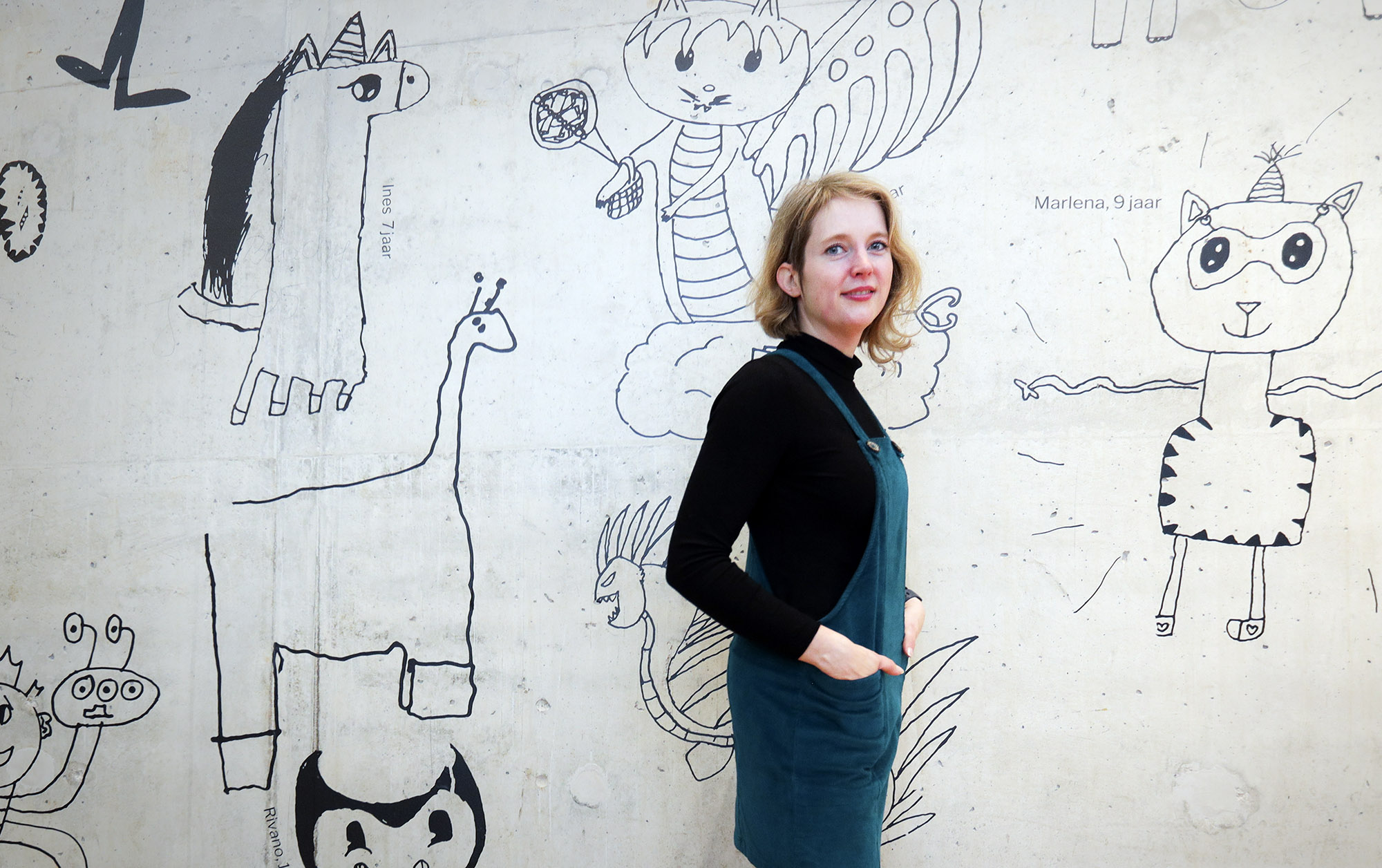Teaching pre-schoolers through VR goggles

Teaching methods are continually being innovated and improved, including through virtual reality (VR). Jolien Mouw, assistant professor at the UG and educational scientist, is fully engaged in teaching innovation. According to her, simply teaching without thinking about ways to improve is a no-go.
Text: Loïs Meussen / Photos: Henk Veenstra
‘I cannot teach without thinking about what students need and how I can improve.’ According to Mouw, teaching and research belong together and are supposed to support one another. Her most recent project in this area uses VR in teaching students of the Primary School Teacher Training College (Academische Pabo), who are being trained to become primary school teachers. In this way, her students can practise teaching without having to immediately jump into the deep end by going into a real classroom. Mouw became aware of this possibility after visiting the UG’s VR lab on a trip that she had organized for other lecturers. She admits that she was perhaps the most enthusiastic visitor after all. This got the ball rolling regarding VR and, in fact, all things connected with learning technology.
Virtual pre-school class
‘You know that you’re sitting in an empty room, but as soon as you put on the VR goggles, you really are in a pre-school class,’ describes Mouw. It feels very real, but that is not the case. For example, there is no supervisor. So, students can – and dare to – try out many things. What happens if they become angry? Or actually stay very calm? The reciprocity between the behaviour of teachers in training and the way that pupils respond to this can be brought into view and also experienced well through VR. With pre-schoolers, for example, it is common practice to get their attention by singing – but not everyone feels comfortable doing this, explains Mouw. ‘In the virtual pre-school class, students can try out other ways of gaining their attention. Other students can also watch what happens and what their fellow students are doing. They can give each other feedback that can then be directly applied, as you can try it again immediately.’
Involving students
Developing a VR pre-school class like this happens in three phases: orientation, implementation, and embedding. Mouw’s students were closely involved in each phase. For example, they were first tasked with observing a pre-school class. What do they face and what really needs to happen in a virtual pre-school class? A student assistant was also appointed to develop didactic materials and to partially guide the VR sessions. ‘I found it important for students to be involved in the whole process. You cannot create teaching innovation alone,’ says Mouw.

No moving chairs
VR offers a rich learning environment, but it absolutely cannot replace internships. The interaction is missing. ‘It is still not possible to touch someone or to move a chair, but we are now resolving this by simply having the student say “come and sit next to me”, so that we know what the student wants and means.’ It is possible to create more interaction within VR but, of course, that comes with a price tag. The technology is developing lightning-fast and, according to Mouw, we will see VR cropping up more and more.
Teaching innovation in the future
Mouw hopes that in future, in addition to the use of VR, there will also be more space for other testing methods. For instance, she proposes that assessment should not simply be used for testing but also as a way of learning: conducting development interviews, carrying out various authentic tasks and assignments, and having a final interview for which students can receive ECTS credit points. She also hopes that more variation will emerge in higher education and that lecturers will purposefully experiment with different forms of teaching. Finally, Mouw hopes that lecturers will use Open Learning materials more, in other words by widely and publicly sharing and reusing existing materials. ‘Crossing the threshold of your own institution and sharing everything with one another. That is what I would like to see.’
Achieving learning outcomes
Mouw wonders why it is unusual in academia to explore how students achieve their learning outcomes and what the best method for this is, instead of just copying predecessors for the sake of efficiency. She draws a parallel with research. ‘Imagine if your supervisor said: “Don’t spend too long thinking about your research design. Just do what we’ve done for years”. Or if you ignored methodological innovations because you actually had no time to consider these. That would really be unthinkable.’ Mouw spends a lot of time on her teaching, and believes that her students deserve the best. ‘I would find it absolutely wonderful if we’d soon reach a future in which teaching and research were valued equally, and in which everyone had the time to develop themselves and their teaching.’

| Last modified: | 07 October 2022 3.49 p.m. |
More news
-
17 March 2025
Liekuut | The high price of conflicts
According to Carsten de Dreu, Professor of Foundations of Cooperation and Social Organization at the University of Groningen, a lot can be learned from conflicts.
-
10 March 2025
Science for Society | Memory Lab for higher marks
Learning facts at school is something hardly anyone likes. The day before a test, pupils cram as many words or names as possible into their heads, only to hopefully remember them the next morning and then forget them again after the test.
-
05 March 2025
Women in Science
The UG celebrates International Women’s Day with a special photo series: Women in Science.
